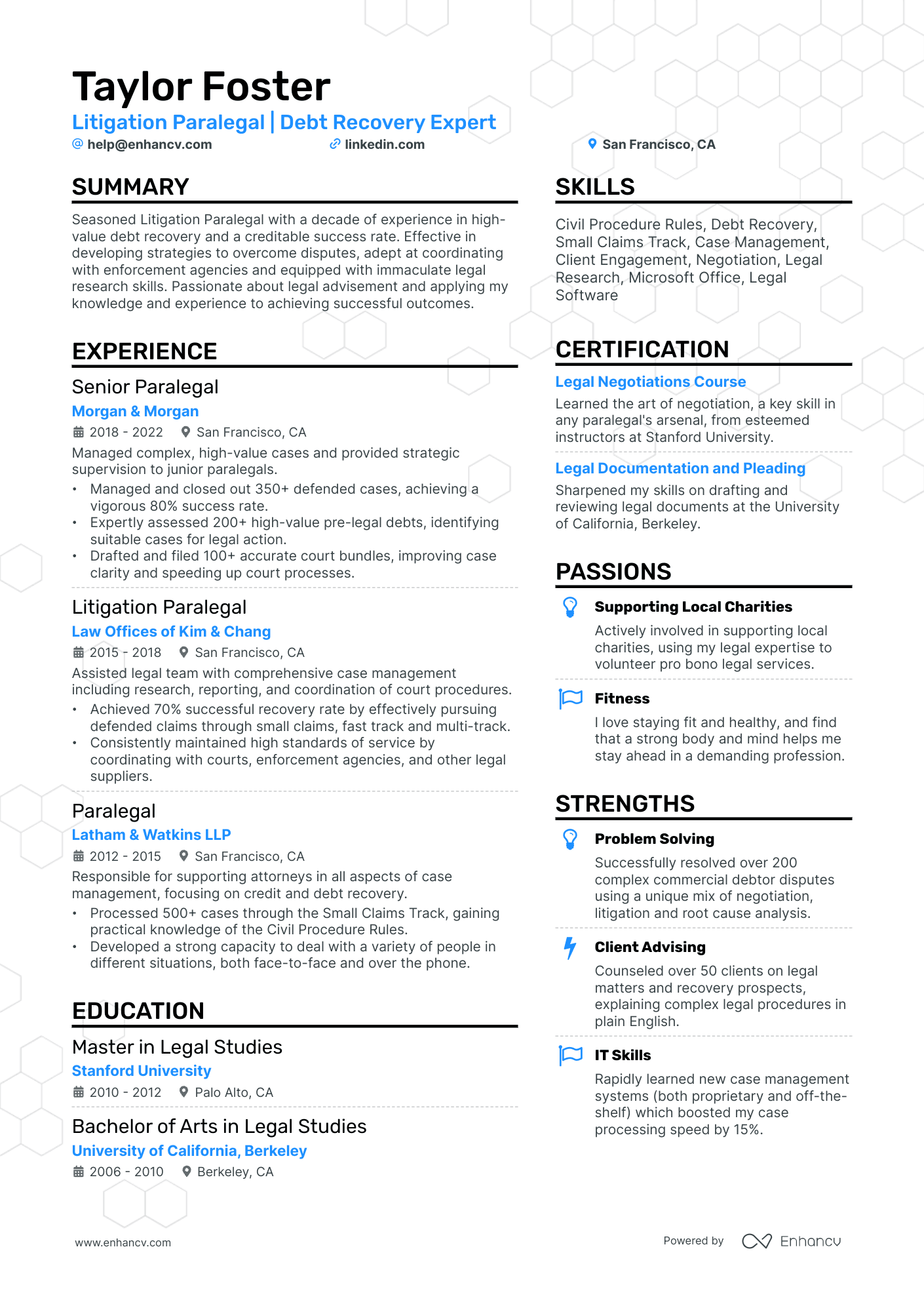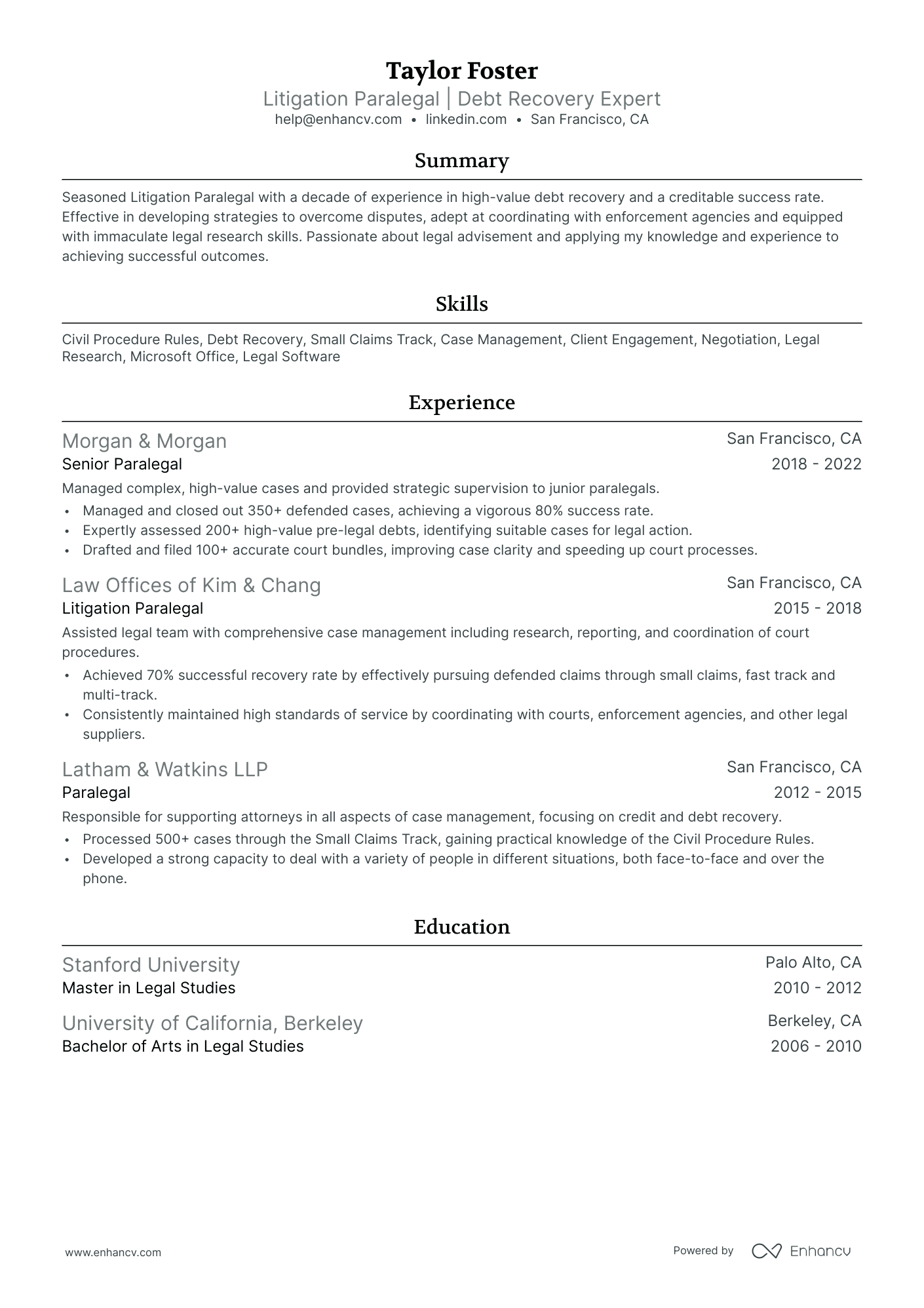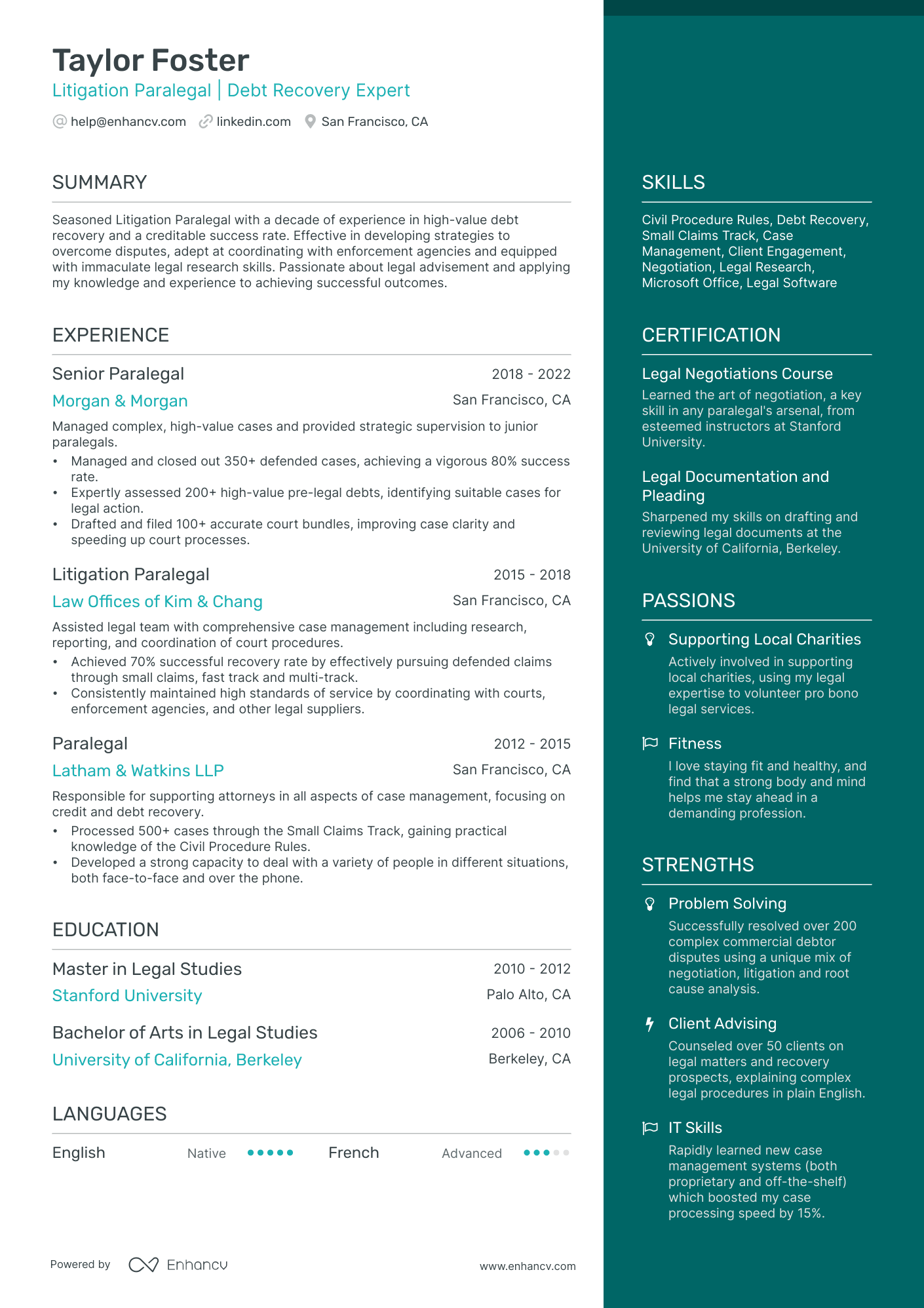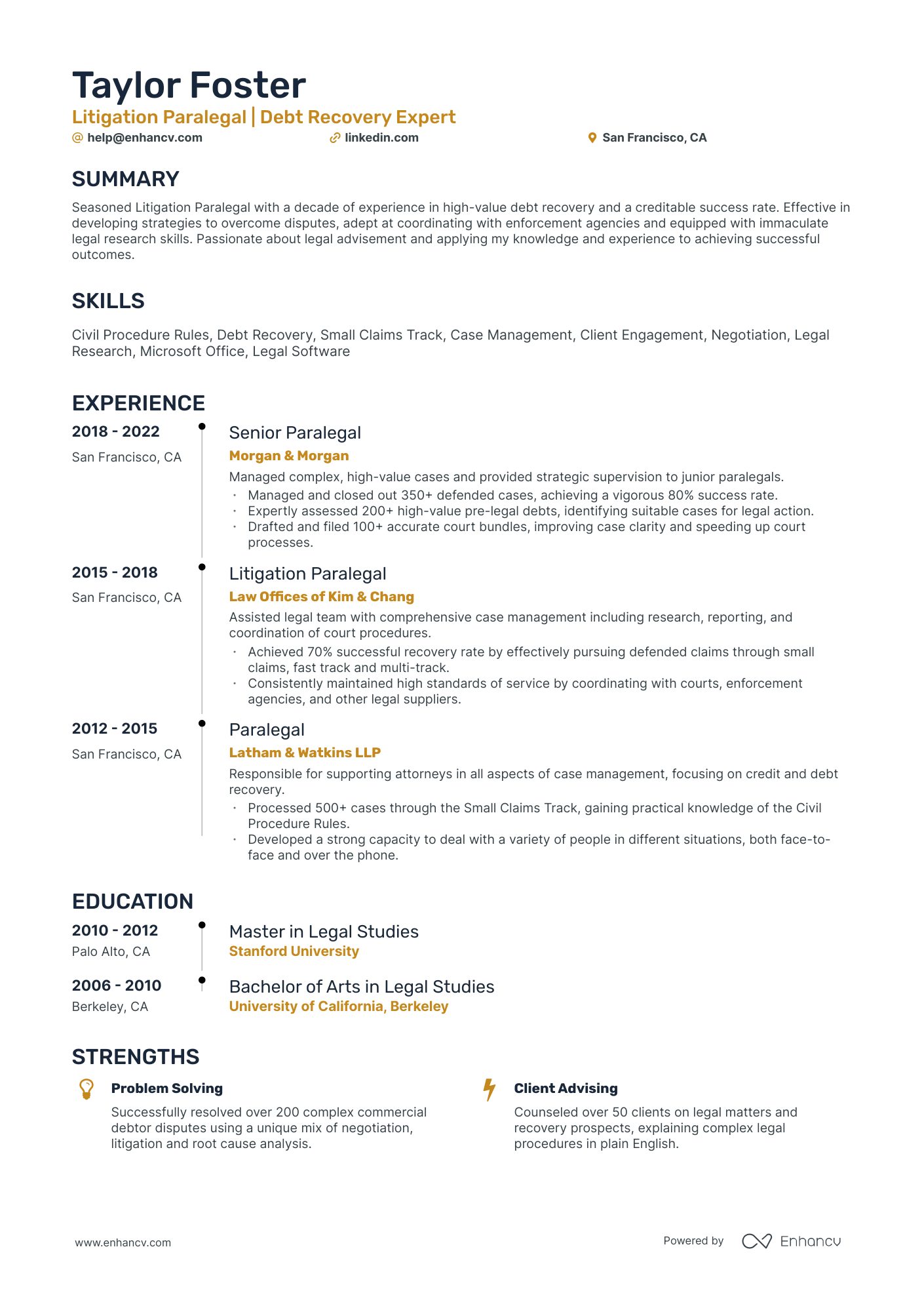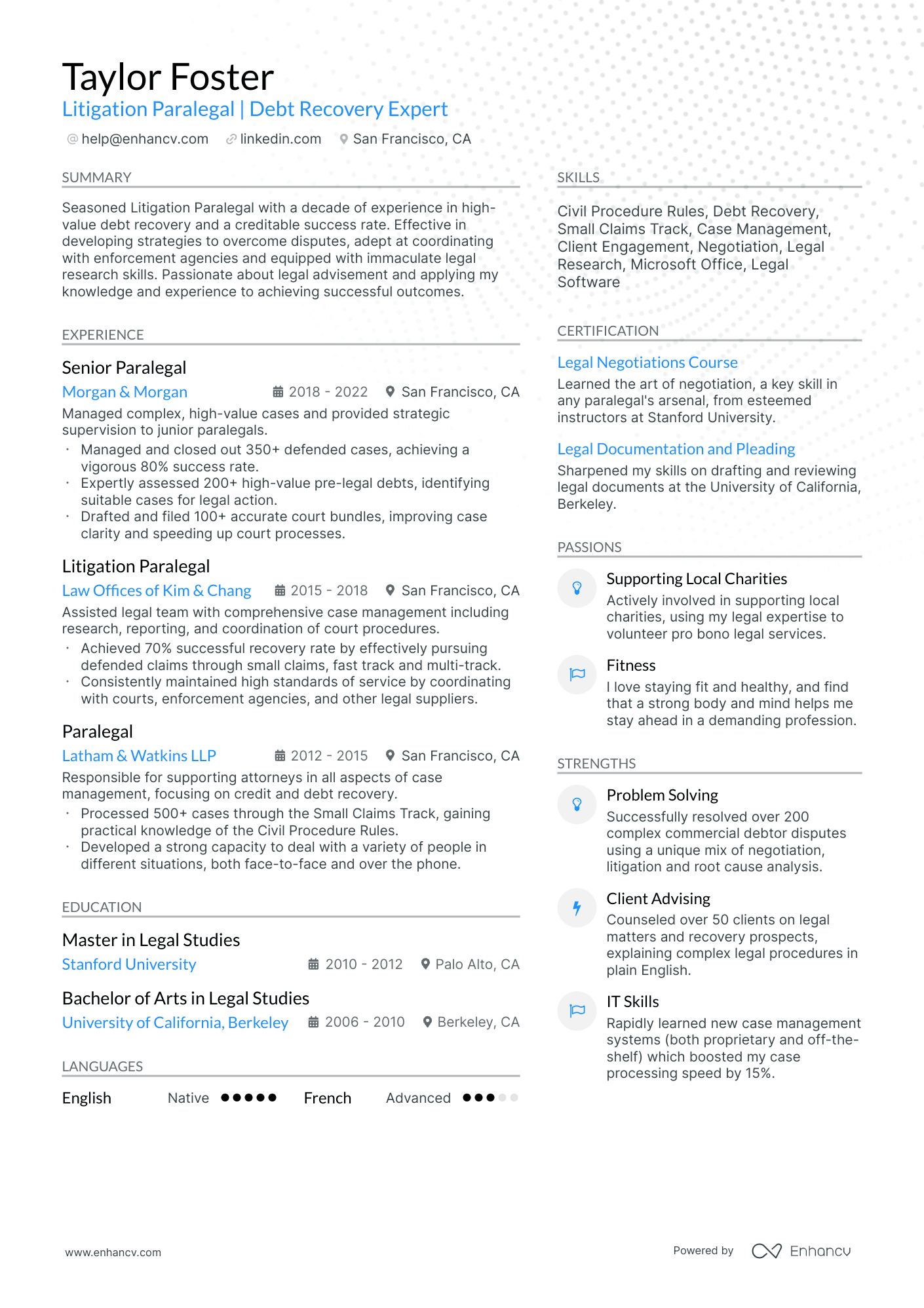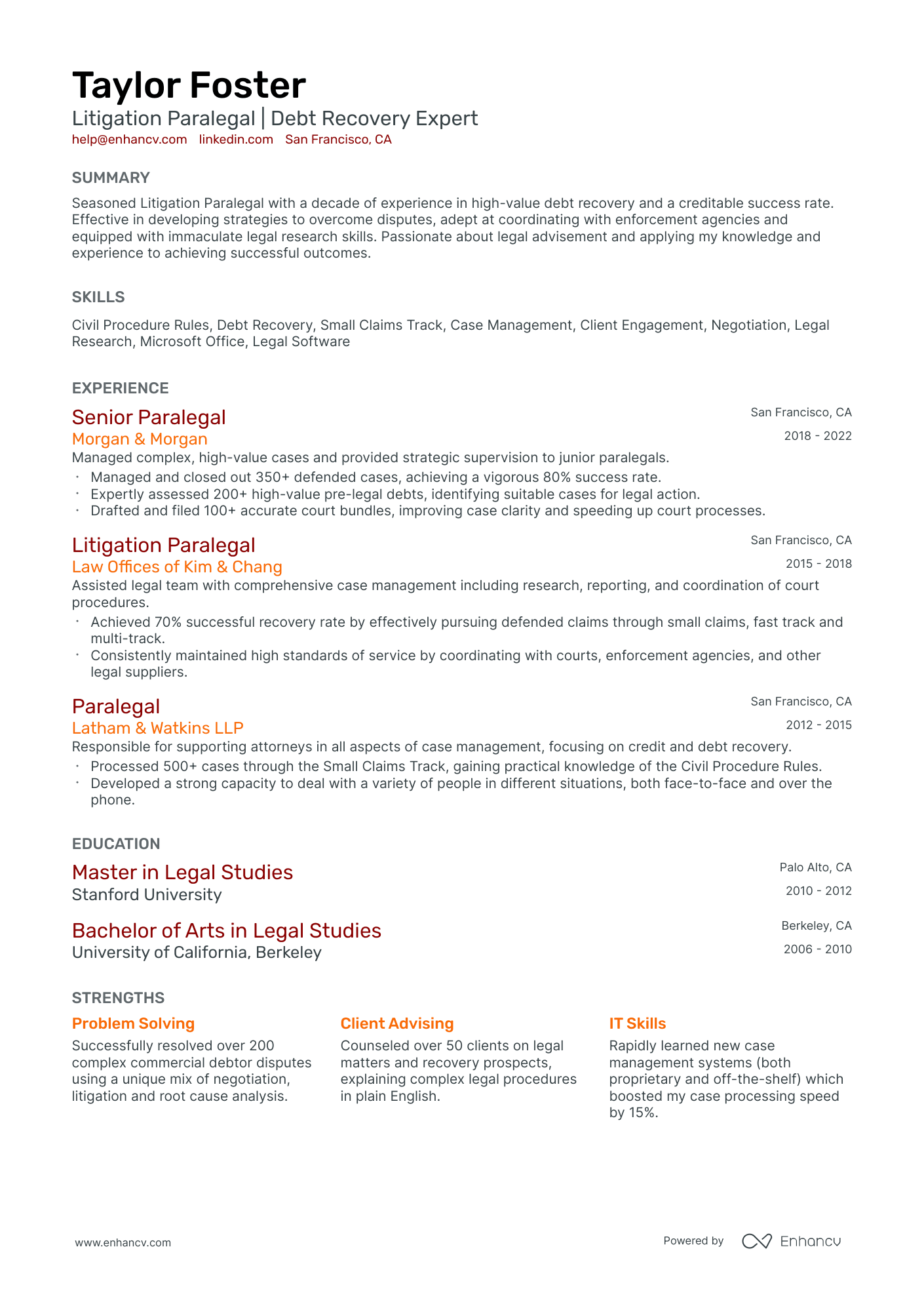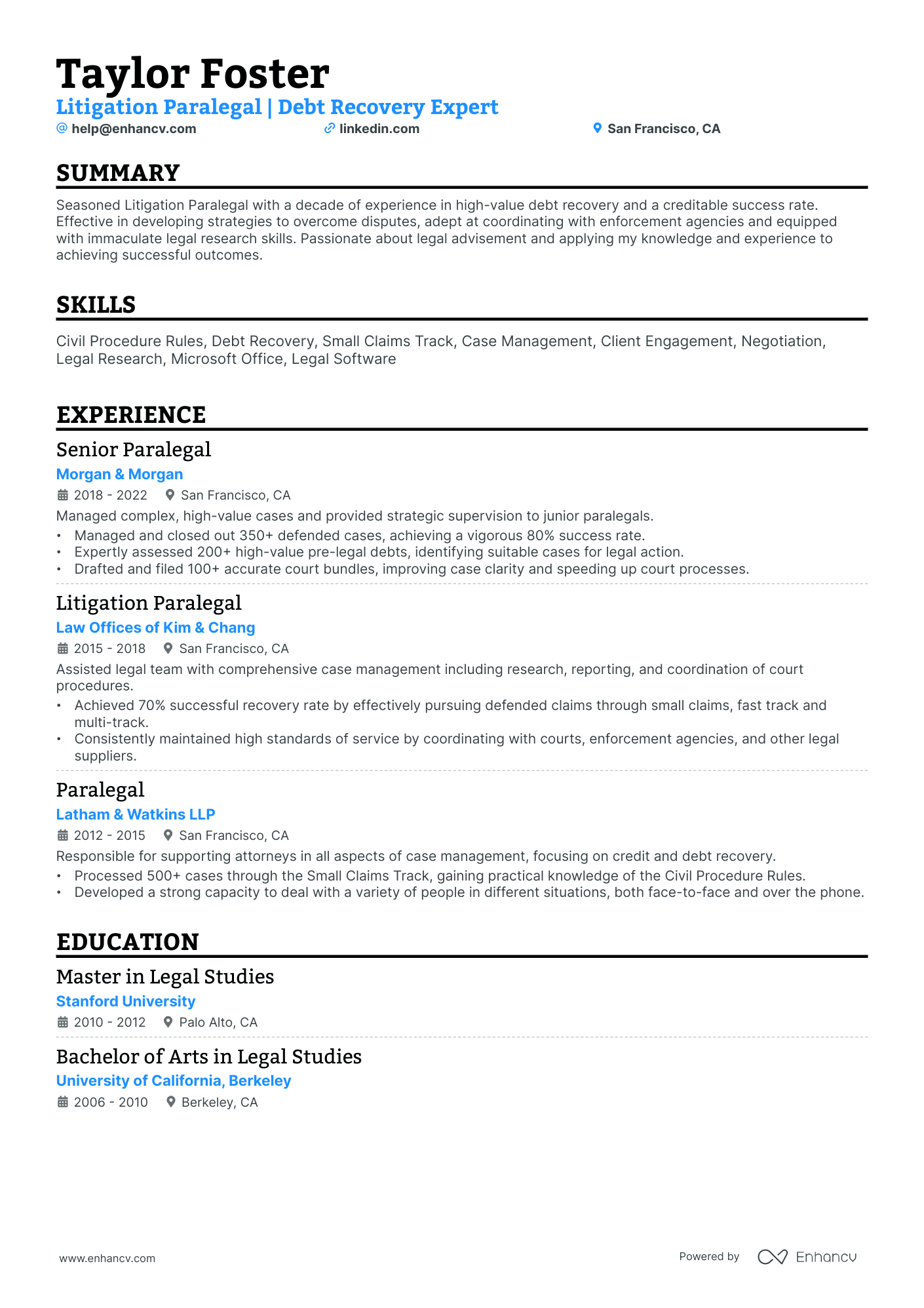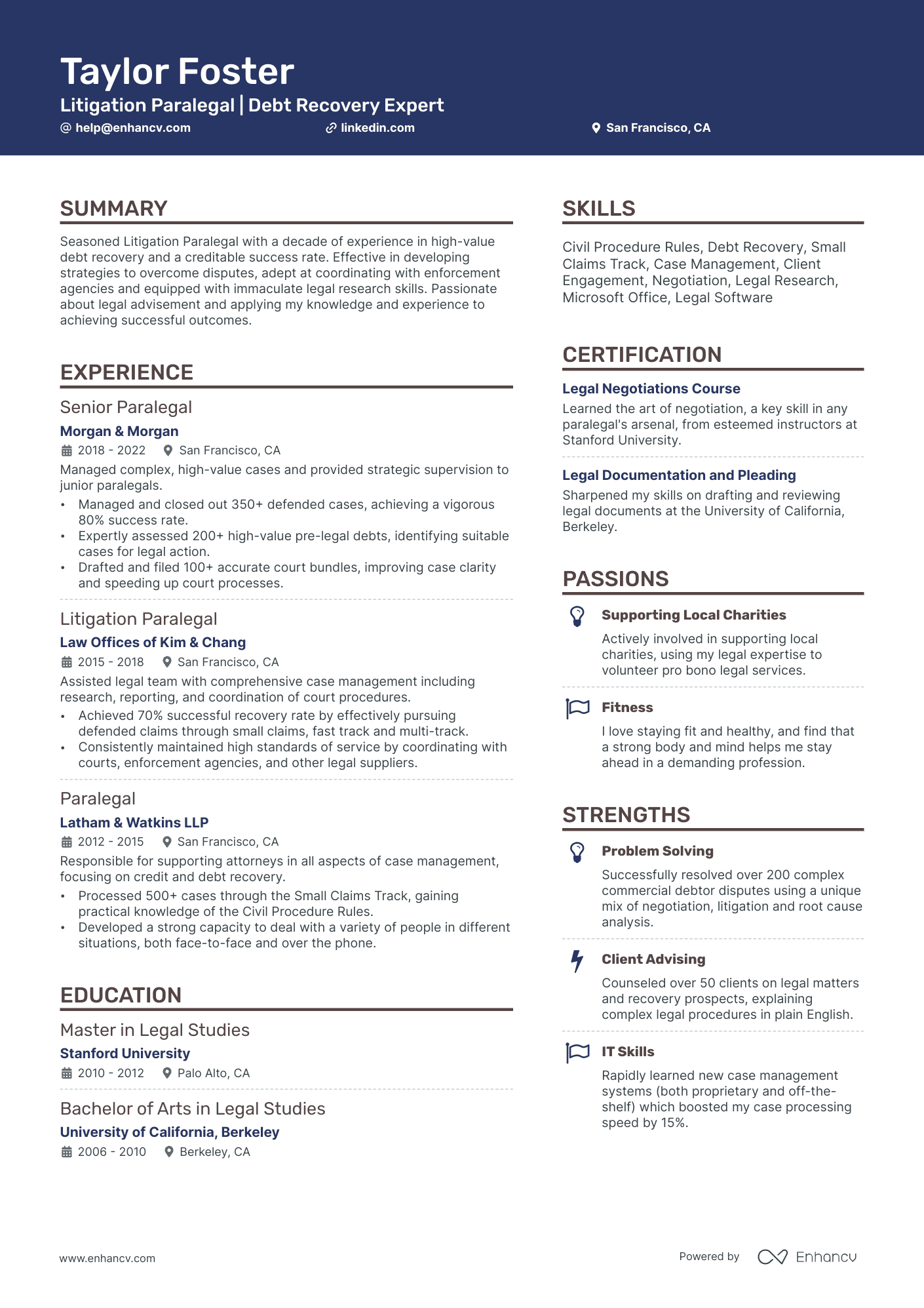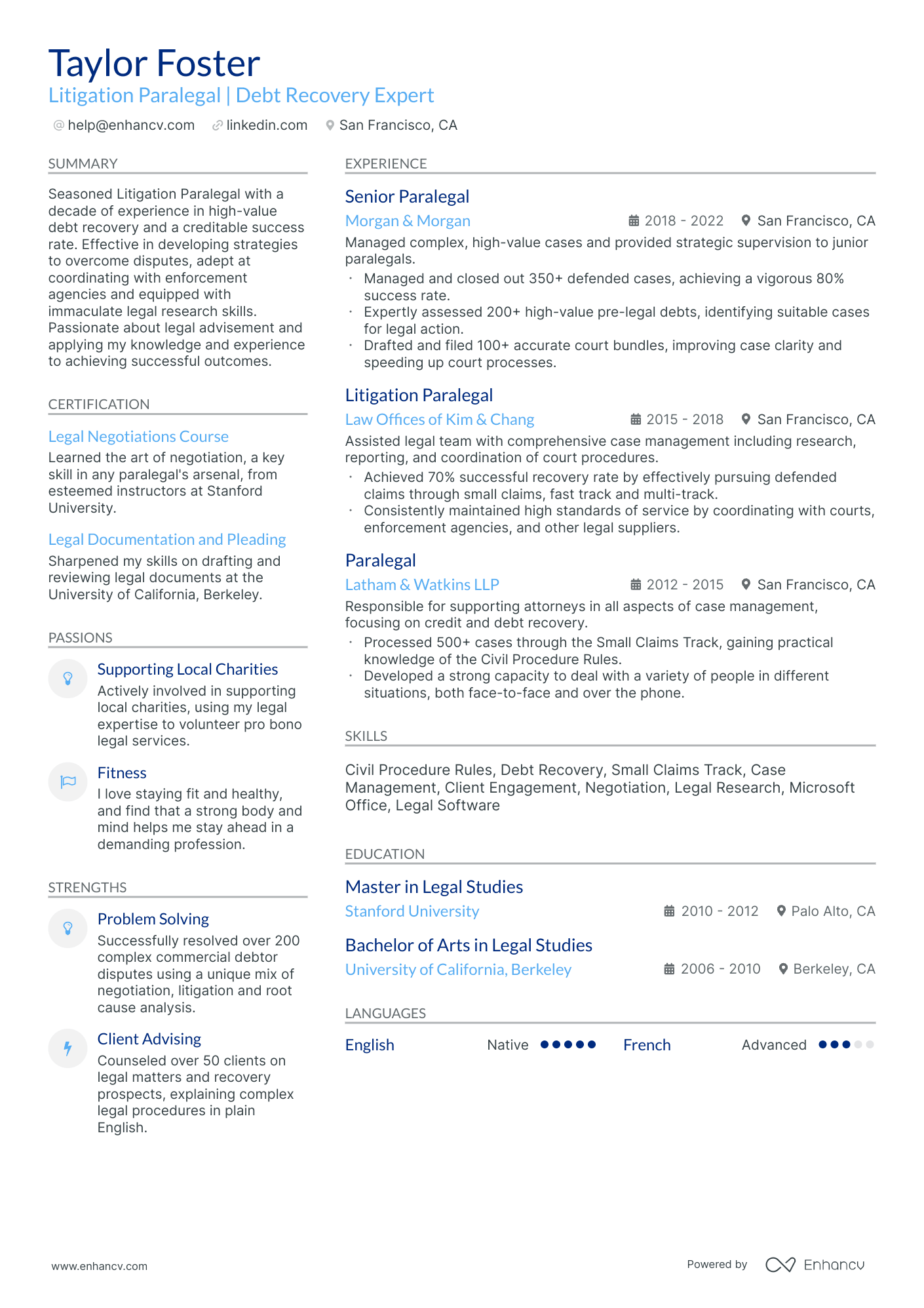Many litigation paralegal resumes fail because they bury case impact under task lists and generic keywords, so ATS filters and recruiters miss relevance during fast scans. In a crowded market, that costs interviews even when your experience matches.
A strong resume shows outcomes that prove you move cases forward. You should highlight deadlines met, discovery volume managed, filings accepted without rework, motions supported, and trial prep delivered on time. Knowing how to make your resume stand out starts with quantifying accuracy, turnaround time, and case load.
Key takeaways
- Quantify case outcomes like discovery volume, filing accuracy, and deadlines met on every bullet.
- Use reverse-chronological format if you have direct litigation experience.
- Choose a hybrid format when switching careers or entering litigation support roles.
- Mirror the job posting's exact tools, terminology, and practice areas in your experience section.
- Demonstrate skills through measurable achievements in your summary and experience, not just a list.
- Place certifications above education when they're recent, litigation-focused, or role-required.
- Use Enhancv's bullet point generator to turn vague task descriptions into results-driven resume bullets.
How to format a litigation paralegal resume
Recruiters reviewing litigation paralegal resumes prioritize case management experience, document review proficiency, and the ability to support attorneys through every phase of litigation—from discovery to trial preparation. A clean, well-structured resume format ensures these signals surface quickly during both human review and applicant tracking system (ATS) scans.
I have significant experience in this role—which format should I use?
Use a reverse-chronological format to present your deepest litigation support experience and growing case complexity at the top of your resume. Do:
- Lead with your most recent role and highlight the scope of your caseload, including case types (e.g., commercial litigation, personal injury, class actions) and the size of the legal teams you supported.
- Feature litigation-specific tools and skills—such as Relativity, Concordance, Westlaw, e-discovery platforms, and court filing systems—within the context of each position.
- Quantify outcomes and contributions wherever possible, including case volumes, document review counts, filing deadlines met, and cost or time savings you contributed to.
I'm junior or switching into this role—what format works best?
A hybrid format works best because it lets you lead with litigation-relevant skills while still showing your work history in chronological order. Do:
- Place a skills section near the top of your resume featuring litigation-specific competencies such as legal research, deposition preparation, case management software, and court filing procedures.
- Include internships, academic projects, or pro bono work that involved litigation tasks—such as drafting discovery requests, preparing trial binders, or summarizing depositions—even if the experience was unpaid or part of a certificate program.
- Connect each listed skill or experience to a concrete action and a clear result so recruiters can see how you apply what you know.
Why not use a functional resume?
A functional format strips away the timeline of your litigation experience, making it difficult for recruiters and hiring attorneys to assess your familiarity with case lifecycles, filing deadlines, and progressively complex caseloads. Avoid this format entirely if you have any direct litigation support experience, even at the internship level, because chronological context is what demonstrates your readiness to handle active case demands.
- A functional resume may be acceptable if you're transitioning from a non-legal administrative role or returning to the workforce after an extended gap—but only if you anchor every listed skill to a specific project, case, or measurable outcome rather than presenting skills in isolation.
Once you've established a clean, readable format, the next step is determining which sections to include so each one strengthens your candidacy.
What sections should go on a litigation paralegal resume
Recruiters expect to see a clean, case-focused resume that proves you can support litigation teams accurately, fast, and under deadline. Understanding which resume sections to include is critical for maximum clarity.
Use this structure:
- Header
- Summary
- Experience
- Skills
- Projects
- Education
- Certifications
- Optional sections: Awards, Volunteering, Languages
Your strongest experience bullets should emphasize measurable impact, case scope, deadlines met, and results delivered across discovery, filings, trial prep, and attorney support.
Is your resume good enough?
Drop your resume here or choose a file. PDF & DOCX only. Max 2MB file size.
Now that you’ve outlined the key resume components, you can focus on writing your litigation paralegal experience section to show how your work delivered results in each area.
How to write your litigation paralegal resume experience
Your experience section proves you can manage complex litigation workflows, deliver case-ready documents, and drive efficiency across every phase of the legal process. Hiring managers prioritize demonstrated impact—measurable outcomes, proficiency with litigation-specific tools, and delivered work product—over descriptive task lists. Building a targeted resume that aligns your experience with the specific role is essential.
Each entry should include:
- Job title
- Company and location (or remote)
- Dates of employment (month and year)
Three to five concise bullet points showing what you owned, how you executed, and what outcomes you delivered:
- Ownership scope: the case types, dockets, document management systems, or discovery processes you were directly accountable for within the litigation lifecycle.
- Execution approach: the legal research platforms, e-discovery tools, case management software, or procedural frameworks you used to prepare filings, organize evidence, and support trial preparation.
- Value improved: changes to case turnaround time, document accuracy, filing compliance, discovery efficiency, or risk reduction that resulted from your contributions to active litigation matters.
- Collaboration context: how you coordinated with attorneys, opposing counsel, court clerks, expert witnesses, or clients to advance case strategy and meet critical deadlines.
- Impact delivered: outcomes expressed through resolved caseloads, successful filing records, reduced costs, or strengthened case positioning rather than routine task descriptions.
Experience bullet formula
A litigation paralegal experience example
✅ Right example - modern, quantified, specific.
Litigation Paralegal
Hawthorne & Pierce LLP | Chicago, IL
2021–Present
Mid-size litigation firm handling high-volume commercial disputes and employment matters across state and federal courts.
- Managed end-to-end eDiscovery in Relativity and Everlaw—coordinated legal holds, collections, and review workflows—reducing review time by 28% and cutting outside vendor costs by $45K annually.
- Drafted and filed pleadings, discovery requests, and motions via CM/ECF and state e-filing portals—maintained a 99% on-time filing rate across 120+ deadlines per year with zero court rejections.
- Built deposition and trial prep systems in CaseMap, TextMap, and Microsoft Excel—indexed 3,500+ exhibits and linked testimony to key issues—shortening attorney prep time by 20% for five trials and eight arbitrations.
- Coordinated subpoena compliance and records retrieval with clients, custodians, and third-party vendors—tracked production status in SharePoint and Microsoft Teams—improving response cycle time from ten days to six days on average.
- Analyzed privilege and confidentiality issues with attorneys—implemented redaction and quality control checklists in Adobe Acrobat Pro and Relativity—reducing privilege log errors by 35% and preventing two potential inadvertent disclosures.
Now that you've seen how a strong experience section comes together, let's look at how to adjust those details to match the specific litigation paralegal role you're targeting.
How to tailor your litigation paralegal resume experience
Recruiters evaluate your litigation paralegal resume through applicant tracking systems and manual review. Tailoring your resume to the job description ensures your qualifications register with both.
Ways to tailor your litigation paralegal experience:
- Match specific e-discovery platforms or case management software listed in the posting.
- Use the exact litigation terminology the employer applies to legal processes.
- Mirror deposition coordination or trial preparation methods the role describes.
- Include relevant practice area experience such as civil defense or plaintiff work.
- Highlight document review workflows or coding standards the job references.
- Emphasize court filing compliance or procedural accuracy when the posting requires it.
- Reflect team collaboration structures like attorney support models they outline.
- Align your discovery or subpoena management scope with their stated expectations.
Tailoring means aligning your real accomplishments with what the role demands, not forcing disconnected keywords into your experience.
Resume tailoring examples for litigation paralegal
| Job description excerpt | Untailored | Tailored |
|---|---|---|
| Manage and organize case files for complex commercial litigation matters using Relativity for document review and production. | Helped with file organization and document management tasks. | Managed case files for 15+ complex commercial litigation matters, organizing and producing over 50,000 documents through Relativity for court-mandated discovery deadlines. |
| Prepare deposition summaries, draft motions, and coordinate with outside counsel on multi-party civil defense cases. | Assisted attorneys with legal documents and communication tasks. | Drafted deposition summaries and motions for multi-party civil defense cases involving up to eight co-defendants, coordinating schedules and filings with three outside counsel teams. |
| Conduct legal research on state and federal procedural rules and maintain trial binders, exhibit lists, and witness files for trial preparation. | Did research and helped prepare materials for court proceedings. | Conducted legal research on state and federal procedural rules using Westlaw, and assembled trial binders, exhibit lists, and witness files for a six-week product liability trial with 200+ exhibits. |
Once you’ve aligned your experience with the role’s litigation needs, quantify your litigation paralegal achievements to show the measurable impact of that work.
How to quantify your litigation paralegal achievements
Quantifying your achievements proves your work reduced risk, improved accuracy, and sped up case progress. Focus on deadlines met, filings processed, discovery volume, error rates, cost savings, and compliance outcomes across matters and courts.
Quantifying examples for litigation paralegal
| Metric | Example |
|---|---|
| Discovery volume | "Managed discovery for eight active matters, processing 120,000+ pages in Relativity and producing 35,000 documents with a 99.6% QC pass rate." |
| Deadline compliance | "Tracked 60+ court deadlines in Outlook and a master docket sheet, achieving 100% on-time filings across three jurisdictions over twelve months." |
| Filing accuracy | "Prepared and e-filed 180 pleadings and motions in PACER and state e-filing portals, cutting rejection notices from twelve per quarter to two." |
| Cost savings | "Negotiated and coordinated court reporter and vendor schedules, reducing deposition and transcript costs by $18,500 across twenty-two depositions." |
| Risk reduction | "Standardized litigation hold notices and acknowledgments for 300 custodians, increasing completion from 72% to 96% and reducing missed-hold escalations to zero." |
Turn vague job duties into measurable, recruiter-ready resume bullets in seconds with Enhancv's Bullet Point Generator.
Once you've crafted strong, results-driven bullet points, the next step is ensuring your skills section highlights the right mix of hard and soft skills that reinforce your litigation paralegal expertise.
How to list your hard and soft skills on a litigation paralegal resume
Your skills section shows you can support discovery, filings, and trial prep, and recruiters and an ATS (applicant tracking system) scan this section to match keywords fast; aim for a hard-skill-heavy mix with targeted soft skills that reflect how you execute. Litigation paralegal roles require a blend of:
- Product strategy and discovery skills.
- Data, analytics, and experimentation skills.
- Delivery, execution, and go-to-market discipline.
- Soft skills.
Your skills section should be:
- Scannable (bullet-style grouping).
- Relevant to the job post.
- Backed by proof in experience bullets.
- Updated with current tools.
Place your skills section:
- Above experience if you're junior or switching careers.
- Below experience if you're mid/senior with strong achievements.
Hard skills
Listing relevant hard skills demonstrates your technical proficiency with litigation tools and processes:
- eDiscovery workflows
- Relativity, Everlaw, Logikcull
- Document review, issue coding
- Privilege logs, redactions
- Legal research: Westlaw, LexisNexis
- Deposition preparation, summaries
- Trial binders, exhibit lists
- Court filings: CM/ECF, PACER
- Case management: Clio, iManage
- Microsoft Excel, Adobe Acrobat Pro
- Subpoenas, records retrieval
Soft skills
Complementing your technical abilities with strong soft skills shows how you operate under pressure:
- Prioritize deadlines across matters
- Draft clear attorney-ready summaries
- Coordinate with vendors and court staff
- Flag risks and inconsistencies early
- Manage sensitive information discreetly
- Drive follow-ups to close open items
- Communicate status without prompting
- Align work to case strategy
- Maintain accuracy under time pressure
- Resolve conflicts in document requests
- Take ownership of task handoffs
How to show your litigation paralegal skills in context
Skills shouldn't live only in a bulleted list on your resume. Explore resume skills examples to see how top candidates weave competencies into their narratives.
They should be demonstrated in:
- Your summary (high-level professional identity)
- Your experience (proof through outcomes)
Here's what that looks like in practice.
Summary example
Litigation paralegal with 10+ years in commercial defense, skilled in Relativity-driven document review, deposition coordination, and trial preparation. Streamlined e-discovery workflows that cut review timelines by 30%, supporting attorneys across 50+ federal cases.
- Reflects senior-level experience clearly
- Names industry-standard tools
- Quantifies a process improvement
- Signals strong collaboration skills
Experience example
Senior Litigation Paralegal
Braddock & Steele LLP | Chicago, IL
June 2018–March 2024
- Managed Relativity-based document review for 40+ civil cases, reducing average production time by 25% through standardized coding protocols.
- Coordinated deposition scheduling with attorneys and outside counsel across 12 jurisdictions, maintaining a 98% on-time completion rate.
- Drafted and filed over 300 motions and pleadings using CompuLaw, ensuring zero missed court deadlines during a six-year tenure.
- Every bullet includes a measurable outcome.
- Skills surface naturally through real achievements.
Once you’ve tied your abilities to real tasks and outcomes, the next step is to apply that approach to building a litigation paralegal resume when you don’t have direct experience.
How do I write a litigation paralegal resume with no experience
Even without full-time experience, you can demonstrate readiness through:
- Litigation clinic case file support
- Mock trial exhibit preparation
- Court docket monitoring assignments
- E-discovery coursework and labs
- Legal research and writing projects
- Deposition summary practice exercises
- Volunteer intake and case screening
- Document production and privilege logs
If you're entering the field, our guide on writing a resume without work experience can help you structure these transferable accomplishments effectively.
Focus on:
- Case file organization and naming
- Legal research with citations
- Discovery workflows and tracking
- Court rules and docketing accuracy
Resume format tip for entry-level litigation paralegal
Use a combination resume format because it highlights litigation paralegal skills and projects first, while still showing education and related experience clearly. Do:
- Add a "Relevant Projects" section.
- List tools like Relativity and LexisNexis.
- Quantify outputs like records reviewed.
- Mirror litigation paralegal job keywords.
- Include coursework tied to litigation.
- Built a privilege log in Excel from 120 records using Relativity-style fields, reducing review time by 25% for a mock document production project.
Even without direct experience, your educational background can demonstrate the foundational legal knowledge and skills that qualify you for a litigation paralegal role.
How to list your education on a litigation paralegal resume
Your education section helps hiring teams confirm you have the foundational legal knowledge a litigation paralegal needs. It quickly validates your academic background and training.
Include:
- Degree name
- Institution
- Location
- Graduation year
- Relevant coursework (for juniors or entry-level candidates)
- Honors & GPA (if 3.5 or higher)
Skip month and day details—list the graduation year only.
Here's a strong education entry tailored for a litigation paralegal resume.
Example education entry
Bachelor of Science in Paralegal Studies
Florida State University, Tallahassee, FL
Graduated 2021
GPA: 3.7/4.0
- Relevant coursework: Civil Litigation, Legal Research and Writing, Evidence Law, Federal Court Procedures
- Honors: Dean's List (six semesters), Magna Cum Laude
How to list your certifications on a litigation paralegal resume
Certifications on your resume show your commitment to learning, proficiency with legal tools, and relevance to litigation paralegal work in fast-moving case environments.
Include:
- Certificate name
- Issuing organization
- Year
- Optional: credential ID or URL
- Place certifications below education when your degree is recent and more relevant than older or general certificates.
- Place certifications above education when they are recent, litigation focused, or required by the role you're targeting.
Best certifications for your litigation paralegal resume
- Certified Paralegal (CP)
- Advanced Certified Paralegal (ACP) in Trial Practice
- Professional Paralegal (PP)
- Paralegal CORE Competency Exam (PCCE)
- Registered Paralegal (RP)
- Certified E-Discovery Specialist (CEDS)
- Relativity Certified Administrator (RCA)
Once you’ve positioned your credentials where hiring managers will see them, move to your litigation paralegal resume summary to connect those qualifications to the role’s core requirements.
How to write your litigation paralegal resume summary
Your resume summary is the first thing a recruiter reads, so it must immediately signal your value. A strong opening tailored to litigation paralegal work sets you apart from generic applicants.
Keep it to three to four lines, with:
- Your title and total years of paralegal experience in litigation settings.
- The type of litigation you support, such as civil, commercial, or personal injury.
- Core tools and skills like case management software, e-discovery platforms, and legal research.
- One or two measurable achievements, such as cases supported or filing accuracy rates.
- Soft skills tied to real outcomes, like organization that reduced missed deadlines.
PRO TIP
At the entry or mid level, focus on specific litigation skills, relevant tools, and early contributions that show you can handle the pace. Highlight concrete tasks you've owned, like document review or deposition prep. Avoid vague phrases like "passionate team player" or "hard-working self-starter." Recruiters want to see what you've done, not how you describe yourself.
Example summary for a litigation paralegal
Detail-oriented litigation paralegal with three years of experience supporting civil defense teams. Skilled in Relativity, trial prep, and case management. Coordinated document review for 15+ cases, reducing prep time by 20%.
Optimize your resume summary and objective for ATS
Drop your resume here or choose a file.
PDF & DOCX only. Max 2MB file size.
Now that your summary effectively showcases your litigation expertise, make sure recruiters can actually reach you by setting up a polished, complete resume header.
What to include in a litigation paralegal resume header
A resume header is the top section with your key identifiers, and it boosts visibility, credibility, and recruiter screening for a litigation paralegal role.
Essential resume header elements
- Full name
- Tailored job title and headline
- Location
- Phone number
- Professional email
- GitHub link
- Portfolio link
A LinkedIn link lets recruiters verify your experience fast and supports screening.
Don't include a photo on a litigation paralegal resume unless the role is explicitly front-facing or appearance-dependent.
Keep the header to two lines, match your job title to the posting, and use the same name and dates across all profiles.
Example
Litigation paralegal resume header
Jordan Taylor
Litigation Paralegal | E-Discovery, Case Management, Trial Prep
Chicago, IL | (312) 555-01XX | your.name@enhancv.com
github.com/yourname yourwebsite.com linkedin.com/in/yourname
Once your contact details and role-specific identifiers are set at the top, add additional sections to highlight supporting qualifications that strengthen your litigation paralegal candidacy.
Additional sections for litigation paralegal resumes
Adding extra sections helps you stand out when your core qualifications match other litigation paralegal candidates equally well.
Choose sections that reinforce your courtroom readiness, legal expertise, or professional credibility:
- Languages
- Professional affiliations (e.g., National Association of Legal Assistants)
- Legal publications or case summaries
- Continuing legal education and specialized training
- Volunteer or pro bono legal work
- Awards and recognitions
- Hobbies and interests
Once you've strengthened your resume with relevant additional sections, pairing it with a well-crafted cover letter can further set your application apart.
Do litigation paralegal resumes need a cover letter
A cover letter isn't required for a litigation paralegal, but it often helps in competitive postings or firms that expect one. If you're unsure where to start, learning what a cover letter is and how it complements your resume can clarify its value. It can make a difference when your resume doesn't clearly show fit, relevant matter exposure, or why you're targeting that team.
Use a cover letter to add context your resume can't:
- Explain role and team fit: Connect your case support strengths to the practice area, case volume, and attorney workflow.
- Highlight one or two relevant projects or outcomes: Summarize a discovery workflow, trial prep effort, or filing process improvement, and note the measurable result.
- Show understanding of the business context: Reference the firm's practice focus, typical clients, and how deadlines, accuracy, and confidentiality drive results.
- Address career transitions or non-obvious experience: Translate adjacent work into litigation paralegal skills, and explain any gaps or changes in a direct way.
Drop your resume here or choose a file.
PDF & DOCX only. Max 2MB file size.
Even if you choose to skip a cover letter and rely on your resume to carry your application, the next step is using AI to improve your litigation paralegal resume so it communicates your value more clearly and consistently.
Using AI to improve your litigation paralegal resume
AI can sharpen your resume's clarity, structure, and overall impact. It helps tighten language and highlight relevant strengths. But overuse strips authenticity fast. Once your content feels clear and role-aligned, step away from AI. For practical guidance, explore these ChatGPT resume writing prompts designed to strengthen specific sections.
Here are 10 practical prompts you can copy and paste to strengthen specific sections of your resume:
- Strengthen your summary: "Rewrite my litigation paralegal resume summary to emphasize case management experience and courtroom preparation skills in three concise sentences."
- Quantify experience bullets: "Add measurable outcomes to these litigation paralegal experience bullets, focusing on case volumes, filing deadlines met, and document review totals."
- Tighten action verbs: "Replace weak verbs in my litigation paralegal experience section with strong, specific action verbs tied to legal research and trial support."
- Align skills strategically: "Reorganize my litigation paralegal skills section to prioritize abilities matching this job description, removing irrelevant or redundant entries."
- Clarify case contributions: "Rewrite these litigation paralegal project descriptions to clearly state my role, the legal matter type, and the outcome I supported."
- Improve certification details: "Reformat my litigation paralegal certifications section so each entry includes the credential name, issuing body, and completion date."
- Refine education entries: "Edit my litigation paralegal education section to highlight relevant coursework, honors, and legal research training in a clean format."
- Remove filler language: "Identify and remove vague or redundant phrases from my litigation paralegal resume without losing any meaningful detail."
- Target a posting: "Tailor my litigation paralegal experience bullets to match this specific job posting's requirements, using keywords from the listing."
- Sharpen formatting consistency: "Review my litigation paralegal resume for inconsistent punctuation, tense shifts, and formatting errors across all sections."
Stop using AI once your resume sounds accurate, specific, and aligned with real experience. AI should never invent experience or inflate claims—if it didn't happen, it doesn't belong here.
Conclusion
A strong litigation paralegal resume highlights measurable outcomes, role-specific skills, and a clear structure. Use metrics to show impact on deadlines, filings, discovery volume, and case readiness. Keep each section focused, consistent, and easy to scan.
Today’s hiring market rewards litigation paralegal candidates who show accuracy, speed, and sound judgment. When your resume connects results to core tasks and tools, it signals you’re ready to support active matters now and next.
